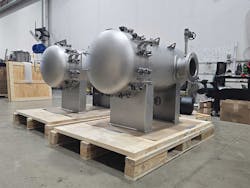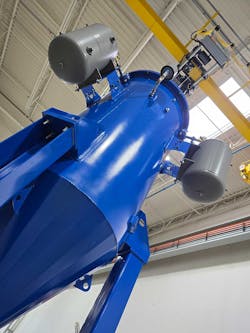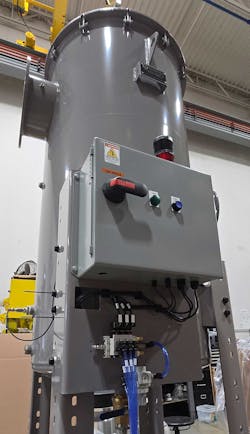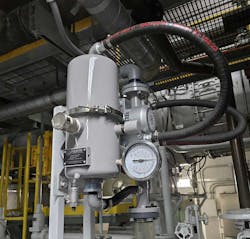The Future of Filtration: The Invisible Force Enabling Industries
Key Highlights
- Filtration: the unseen force enabling cleaner, safer, and more efficient industries.
- Tomorrow’s filters will be self-cleaning, intelligent, and always performance ready.
- Smart filtration powered by AI and IoT drives productivity and profitability.
- Space applications fuel innovation that shapes Earth’s filtration future too.
- Advanced filtration delivers sustainability, compliance, and a competitive edge.
Filtration is everywhere and it’s often invisible to the casual observer. At its core, filtration is the science and practice of separating what we want to keep from what we must remove. It is part of nearly every industrial process ensuring performance, safety, and sustainability in ways most people never notice.
Filtration takes many forms, but its purposes are consistent:
- Protecting equipment from harmful contaminants that can damage components, degrade performance, or cause downtime.
- Purifying air, gas, and liquid streams by removing unwanted contaminants that compromise product quality or process integrity.
- Protecting personnel and the work environment by capturing and removing harmful emissions before they can contaminate the surrounding area.
- Separating and isolating desirable products from process streams and recovering valuable powders, chemicals, or other process outputs that would otherwise be lost.
Filtration enables systems to run smoothly, safely, and efficiently. From food processing to battery manufacturing, filtration is the silent enabler that makes many aspects of modern life possible.
Why Filtration Matters More Than Ever
Solberg’s SRS Series scrubber tank uses advanced filtration media technology to remove volatiles and contaminants during polymer conversion processes in full-vacuum or high-pressure conditions.
Filtration has always been a behind the scenes catalyst for industry. Manufacturing leaders know that even a small investment in the right filtration system can drive significant improvements in both productivity and profitability.
At its simplest level, filtration protects equipment including vacuum pumps, compressors, turbines, and countless other machines. At a deeper level, advanced filtration systems enable businesses to operate more effectively. Highly optimized filtration systems minimize production line disruptions, improve workplace safety, and help improve quality of outputs. One clogged or compromised filter can cause tens of thousands of dollars in downtime per day.
Filtration’s role goes beyond improving equipment performance and reliability. It enables breakthroughs in high-tech fields like aerospace, semiconductors, and electronics. Whether it’s preventing harmful particulates, liquids, or vapors from entering equipment or keeping those contaminants from entering the working environment, filtration is essential for helping industrial and high-tech manufacturing companies achieve their business goals.
Imagining the Future: Maintenance-Free, Self-Cleaning, Intelligent Filters
Solberg’s RX Series fully automated reverse-pulse system is engineered for inert gas recovery in semiconductor and high purity metallurgy applications, using smart self-cleaning technology to regenerate filters automatically.
Looking ahead 15-20 years, we can imagine a world where filtration takes a dramatic leap forward. One of the industry’s biggest challenges is that effective filters inevitably clog. That means regular maintenance, equipment downtime, and human intervention are all operational realities.
But what if filters could maintain themselves through self-monitoring and self-cleaning? Imagine filter media technologies that interact with contaminants in ways we don’t yet fully understand, extending service life far beyond today’s standards. Imagine filters that maintain peak efficiency without ever declining in performance.
The vision of a truly maintenance-free filter may seem ambitious, but with advances in robotics, automation, and AI, the possibility is moving closer to reality.
The Evolution of Smart Filtration: AI, IoT, and Predictive Analytics
Solberg’s TKO Series automated liquid knockout system integrates pneumatic draining, PLC connectivity, and real-time sensor feedback to capture and remove liquids during aerospace machining operations.
Filtration is already moving toward digital intelligence. Filters are beginning to function as data-driven nodes within the smart factory ecosystem.
Future filters will not only capture contaminants, but they will also analyze them. By embedding sensors and IoT technology, filters will measure particle load, size distribution, and environmental conditions in real time. This information can then feed into AI-driven analytics that predict when a filter needs to be serviced, swapped, or regenerated.
Imagine a system where filters dynamically adjust their efficiency based on process demands. Or parallel systems that automatically redirect flow to a clean filter while the dirty filter undergoes a self-cleaning operation without impacting production.
With predictive analytics, filters become proactive partners rather than reactive bottlenecks, keeping entire systems optimized and reliable.
Filtration Beyond Earth: The Space Exploration Challenge
The future of filtration isn’t confined to Earth. As humanity sets its sights on Mars and beyond, filtration technology will evolve for long journeys and extreme environments.
In space or on another planet, a failed filter could bring a mission to a halt. Filters will need to last longer, withstand harsher conditions, and operate with minimal human oversight. Gravity, atmosphere, and resource scarcity will all demand designs that are radically more resilient and autonomous.
The NASA.gov website provides an incredible account of collaboration, resourcefulness, and engineering to avoid catastrophe during the Apollo 13 moon mission of April 1970. This mission gave us the famous phrase “Houston, we’ve had a problem.” At the center of this story is filtration.
After an oxygen tank explosion in the spacecraft, the command module was shut down to preserve power and many functions, including life support systems, were disrupted or disabled. With limited options for survival, the lunar module had to serve as a lifeboat to return the astronauts to Earth.
The lunar module was designed to support only two people for about 30 hours. Now it would need to support three people for about four days. The lunar module had lithium hydroxide (LiOH) canisters to filter and remove excess carbon dioxide (CO₂) from cabin air, but not enough of them for the higher CO₂ load produced by three people over the time it would take to return to Earth.
LiOH canisters were available from the command module, but they were square in shape and incompatible with the lunar module’s round canister receptacles. Back in Houston, Mission Control devised an adapter using only the materials already on board the spacecraft: plastic bags, gray duct tape, cardboard cue cards, and space suit hoses. They transmitted instructions to the crew, who built the adapter, enabling the square canisters to filter and scrub CO₂ through the lunar module environmental control system. The fix worked and the astronauts returned safely to Earth.
The Apollo 13 mission highlights several key considerations for filtration in remote or extreme environments:
- Filtration systems must be modular and interoperable so that in crisis, components can be adapted or repurposed.
- Redundancy is essential. Filtration systems must be able to handle unexpected loads.
- Autonomous regeneration and self-cleaning technology are essential for extended operational requirements.
As we plan for future missions, long stays on the Moon, colonization of Mars, and manufacturing in space, these lessons are instructive. In addition to being light weight and compact, filters will need to be more robust, more intelligent, and more self-sufficient. Automation will be critical. Colonies will have smaller highly specialized workforces with limited resources to monitor, change, and clean filters.
Filters will need predictive intelligence, automation, and redundancy. They will need systems that can swap or clean themselves without interrupting essential processes. The demands of space exploration will accelerate the development of smarter, longer-lasting filters for applications here on Earth as well.
The Future Is Already Here: Today’s Innovations
While futuristic visions grab attention, many of these ideas already exist in early forms. Across industries, we’re seeing breakthroughs that lay the groundwork for tomorrow’s systems:
- Self-cleaning filters that use sensors to measure pressure drop and trigger reverse pulses to clear the media.
- Auto-drain systems that remove captured liquid contaminants automatically, keeping housings free to capture more.
- Specialized media coatings that alter contaminant behavior, such as converting vapors into liquids or improving particle release during cleaning cycles.
- Sensors and counters that measure particle sizes, concentrations, and environmental variables with remarkable precision.
What excites today’s filtration engineers is how quickly sensor and circuit technologies are shrinking in size, complexity, and cost. This means smarter, more connected filters are becoming accessible to industries that once considered them out of reach.
Business Impact: Invest in Filtration, See Productive Returns
Solberg’s BAE Series self-regulating oil mist eliminator for lubrication systems captures oil mist and adapts in real time to airflow fluctuations ensuring a cleaner and safer operating environment.
Filtration is often an afterthought when selecting an essential piece of production equipment like a vacuum pump or a turbo compressor, but forward-thinking companies know better. Investing in advanced filtration up front can yield huge returns:
- Reduced downtime: Preventing catastrophic failures saves millions in lost production.
- Lower overall costs: Better filtration reduces the need for cleanup, minimizes waste, and extends equipment life.
- Regulatory compliance: Proper filtration helps companies avoid fines by preventing the release of harmful emissions or contaminants.
- Workplace safety: Cleaner environments improve working conditions for employees.
- Competitive edge: Businesses that embrace next-generation filtration differentiate themselves by running cleaner, more efficient, and more reliable operations.
The Call to Industry Leaders
Whether we realize it or not, we live, eat, sleep, and breathe filtration. Almost every major technology that advances humanity relies on filtration in some form. Food safety, clean energy, electronics, and next-gen manufacturing all depend on it.
Filtration is the hidden driver behind the equipment that shapes the world. And now, as we move into an era defined by sustainability, digital intelligence, and even space exploration, filtration has never been more critical.
The message to industry leaders is simple: pay attention to filtration now. It may seem like a small detail, but it’s the detail that makes everything else possible. Partner with innovators who are rethinking how filtration works, and you’ll position your business, and humanity, for success in the decades ahead.
About the author:
Clint Browning is Vice President of Sales and Marketing at Solberg Manufacturing, Inc., where he combines deep expertise in industrial filtration with decades of sales leadership. He has worked across a wide range of industries, gaining extensive insight into application requirements and performance demands. Clint specializes in helping companies address complex filtration challenges while implementing solutions that drive both equipment reliability and business improvement.





